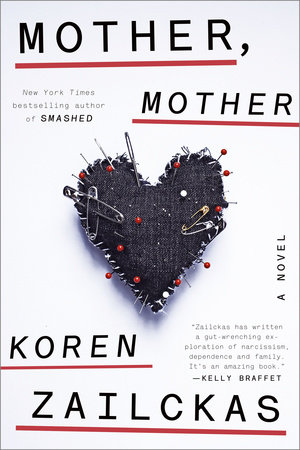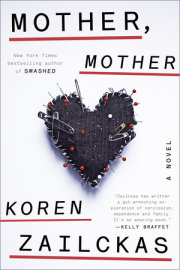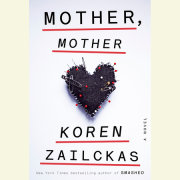William Hurst
Her face was the first thing William Hurst saw when he opened his eyes from his not-so-sweet dreams. His mother, Josephine, was smiling down at him, her blue eyes misty-soft, sunlight streaming through her hair, the same way it did to the happy Jesus in Will’s Storybook Bible.
On this particular Saturday, mother was both a noun and a verb.
Behind her, at the end of Will’s bed, was the frog habitat he’d begged for all summer. It had a paddling pond for tadpoles and a rocky ledge where frogs could doze beneath a canopy of green plastic clover.
Will knew he should be jabbering with excitement. There she was, waiting for him to pump his fist and thrash with glee (not that he would ever dare jump on the bed). But something was off. The timing didn’t add up.
“Is today my birthday?” Will asked. “Did I do something to deserve an extra-special reward?”
“No,” Josephine said. “Today isn’t your birthday. And you, little man, are my extra-special reward.”
She reached for the boy’s face, as if to give his bandaged chin a playful pinch or tuck his too-long hair behind his earlobe. But then the phone rang and her freshly moisturized hand froze, suspended in the space. She pulled away and padded off in her slippers to answer it, a Velcro roller tumbling out of her hair and sticking, burr-like, in the carpet.
The house should have been quiet now that Will’s sixteen-year-old sister Violet had been banished. Oddly, the Hurst family home was louder. Even after his mother hung up her cell phone, her voice remained nervous, her actions rackety. Will followed her downstairs to the kitchen, where the radio was already on, cranked to WRHV. Cupboard doors slammed. Silverware barrel-rolled as she jostled the drawers.
The rotten-egg smell of his father’s morning shower wafted down the staircase. The well water was sulfuric. Violet liked to say that hell smells like sulfur. So do places infested with demons. If Will believed his mother--and he had no reason not to--demons were rebels like Violet. They fell from grace when they looked into God’s gentle eyes and announced they didn’t need him anymore.
At the kitchen table, Josephine asked, “Is a noun a doing word, a describing word, or a naming word?”
“A describing word,” Will told her between swallows of oatmeal.
Josephine’s smile--a bright sideways sliver of moon--made it impossible for him to know whether he’d answered right or wrong.
“Let me put it this way,” she said. “Which word is the noun in this sentence: ‘I always know what I am doing.’ ”
“What.”
“I said, which word is the noun in this sentence--”
“No, Mom. I wasn’t asking, What? I was trying to tell you ‘what’ is the answer.”
“Oh,” Josephine said. “Oh, I was expecting you to say ‘I.’ But I suppose ‘what’ is right in this instance too.”
The portable phone screamed in its cradle. Josephine picked it up and wandered out of the kitchen saying, “No, I told you. I have a twelve-year-old special-needs son. She’s a danger to him. I can’t have her here.”
Will had autistic spectrum disorder with comorbid epilepsy. To him, that always sounded like a good thing--the word spectrum being halfway to spectacular. But Will knew his differences secretly shamed his family, his father, Douglas, in particular. At Cherries Deli, Will was always aware of his dad’s gaze lingering on the youth soccer leagues eating postgame sundaes. Probably, Douglas longed for a sturdier and more social son--a buzz-cut bruiser who could shower and climb stairs unsupervised, without the nagging threat of seizures.
Will’s mother tried to put a positive spin on his health conditions. Once when Will was in a wallowing mood, he’d blubbered, “I’m not like normal people!” And Josephine had consoled him by saying, “No, you’re not. And thank God for that. Normal people are dimwitted and boring.”
Will had received his dual diagnosis nine months ago, and his mother had been homeschooling him ever since. A onetime academic, Josephine was every bit as good as Will’s former teachers. Plus, she custom-made his curriculum. She was patient with Will in math, where it took him ages to grasp square roots, and rode him relentlessly in language arts, where she prided herself on the quality of his writing and his ability to read above grade level.
Violet used to tell Will that he was blessed to have autism. She was studying Buddhism, and she said that Will must have been an exceptionally good person in a past life. A patient, selfless, saintly sort of person. So in this life, he’d been rewarded for his past goodness with heightened sensitivities. According to Violet, Will felt things more deeply and understood things most people overlooked, and this made his everyday more like Nirvana.
Josephine didn’t appreciate his sister’s interest in Eastern religion. She didn’t like the humming sound of Violet’s Tibetan singing bowl, her woodsy incense, the picture of Geshla in a glitzy gold frame on her bedside table.
The Hursts were Catholic. Whenever Violet sat cross-legged with a strand of mala beads, Josephine told her to put away her “faux rosary.” Back in August, Violet had shaved off all her hair with their father’s electric beard trimmer. Will remembered Douglas storming into the family room, a long brown wisp threaded through his fingers, shouting, “Violet! What is the meaning of this?!” Without so much as turning her bald head away from her guided-meditation DVD, Violet had said: “Meanings are the illusion of a deluded mind, Dad. Stop trying to squeeze reality into a verbal shape.”
Violet would not allow herself to be squeezed into anyone’s reality.
“Violet is unpredictable,” Josephine liked to say. “Just when a person thinks she’s got Violet pegged, she transforms like ice into water.”
That was when the trouble started, with one of Violet’s transformations. His sister’s “extreme personality changes” were one of the reasons Josephine had spent the last forty minutes on the phone, whispering about “crisis wards,” “involuntary commitment,” and other words Will couldn’t find in his Scholastic Dictionary.
“Violet is sick,” his mom had explained weeks earlier, after Violet had once again made her dissolve into tears. “You know how parts of our bodies get sick sometimes?” she’d added, dabbing at her eyes. “Like, we get stomachaches or sore throats? Well, Violet is sick in the part of her brain that controls her feelings.”
Will assumed Violet’s brain was sick because she had stopped eating food. Well, not all food. Violet had recently stopped drinking everything except pomegranate juice or milk, and stopped eating everything besides Uncle Ben’s instant rice or a stenchy combination of mung beans and sugar.
As her body got smaller, all of Violet’s clothes started to look like disguises. She wore long-underwear tops, Douglas’s dress shirts, and low-crotched pants that made her look like one of Ali Baba’s forty thieves. Their mother said Violet wore a gauzy kerchief because people at school made fun of her bald-headedness. But when Will asked Violet, she told him she was covering her head because she was doing sallekhana.
“Is that Buddhist?” Will had asked.
”No,” Violet said. “It’s Jainist.”
“But she is suicidal,” Josephine told the person on the phone now. “I’ve done some research, and this Jainist thing--or however you say it--is a ritual fast to death.”
Still in her bathrobe, Josephine was hunched on a stool at the kitchen island. The remaining rollers were gone from her Bambi-brown hair, but she’d been too distracted to reach for her comb. Curls corkscrewed from her scalp at bonkers angles. “Presentation counts”: that was what she’d always taught Will. Seeing her unkempt disturbed him more than almost anything else, and that said a lot given the circumstances.
Will hovered by the stove, trying to feel the stitches beneath the surgical tape on his chin. He made no attempt to disguise his eavesdropping.
“I feel like you’re asking me to choose between my children,” Josephine told the mystery caller. “I love my daughter more than words can express, but I’m terrified of her. She critically injured my son. Uh‑huh. Yes. I am afraid for our lives.”
Whumpa whumpa whump. Josephine’s ballpoint pen was the only sound while the person on the line spoke at length.
“I know we’re not the only victims here. Violet suffers the effects of her condition more than anyone. Uh‑huh. I agree. We’ve tried to get her the medical attention she needs, but she flies into a rage at the very suggestion of it.” She paused and listened briefly. “That--” Josephine’s voice splintered. She jotted down 5150 hold on her notepad and framed it with stars. “That breaks my heart. But if you’re telling me this is her best chance at recovery, then I guess I don’t have much choice.”
Will’s chest twanged with pity and helplessness. He wanted to protect his mother every bit as much as she wanted to safeguard him. It was Will who got hurt last night, but their mother was the one Violet really wished dead.
Of all the crazy that had transpired the night before, Will had felt most unsafe when he saw the way his sister eyed his mother across the dining room table. How Violet-like she’d been, glowering with her hangdog neck and hooded eyes. Anyone else might have mistaken her for someone meek and self-punishing. But Will knew the truth: Violet thought she was proof of nature over nurture. She didn’t need their mom’s loving care to survive.
Will crossed the kitchen and put a supportive arm around his mother’s sashed waist.
Josephine cupped the mouthpiece with her palm and whispered, “Don’t worry, sweetie. You’re safe now. I promise. I won’t ever let her hurt you again.”
Violet Hurst
On her first night in the psychiatric ER, Violet found herself curled up on a stretcher in a hallway that smelled like a combination of dirty hair and Lysol. Her brain was still steaming like an engine turned off after revving, but thanks to the liquid charcoal she’d sipped earlier, she felt a little more coherent, a little less like the universe was a big holographic time loop.
On the stretcher opposite Violet was a thickset Hawaiian woman. She was sitting bolt upright, her eyes flitting around wildly.
“I feel a question,” the woman said. “Is it okay to be me?”
Violet’s first thought was for the woman’s privacy. She assumed the woman was praying aloud or having a heart-to-heart with a voice that she alone could hear. She tried hard not to look at her and instead stared down at the disposable foam slippers she’d received when she arrived barefoot.
At this time last week Violet had been registering by phone for the SAT. She’d been writing an English paper and trying to decide if she ought to go to the Halloween dance. All that seemed like it happened in a previous life. Less than three hours ago, Violet had been reincarnated as a mental patient. She’d walked through three sets of locking doors and a metal detector. She’d peed into a series of cups and had blood drawn from both arms. She’d been stripped of her clothes and handed a pair of pajamas that refused to stay snapped at the waist.
The Hawaiian woman continued her eerie chant. “Why can’t I be me? What’s so unlovable about me?”
“She’s talking to you, you know?” This came from the young Puerto Rican man on the stretcher to Violet’s right. He was lying on his stomach, a supermarket tabloid open between his propped‑up elbows. From the looks of it, he was methodically tearing up the pages and Frankensteining the shreds back together in grotesque combinations, pairing Angelina Jolie’s mouth with John Travolta’s chin and Simon Cowell’s nose.
“Me?” Violet asked stupidly. They were the only three people in the hall, save for the constant flux of orderlies and nurses.
“She says she’s an intuitive,” the man said.
“Oh.” Violet didn’t want to admit she didn’t know what that meant.
“Oahu, over there? She’s got the gift. She gets possessed by the people around her. She feels what we’re feeling, get it? Like some Invasion of the Body Snatchers shit.”
Suddenly accusatory, the woman stopped flailing and turned to stare directly at Violet.
“Who’s controlling you?” she demanded.
Violet thought of Oahu again half an hour later, when the intake nurse asked her, “Do you hear voices or see things other people cannot see or hear?”
While the counselor ran through a series of questions, spitting them out like rapid gunfire, Violet wept convulsively, drawing tissue after tissue from the box balanced between her pajamaed knees.
“Do you have a history of mental health problems?” the counselor asked. “Do you know your clinical diagnosis?”
“No,” Violet said. “Neither.”
“Are you currently taking any drugs, legal or otherwise?”
“No.” She paused. “Well, after school today I ate some seeds a friend gave me. Flower seeds. Morning glories?” According to the Internet drug forum Violet and her best friend, Imogene Field, had consulted, the LSA the seeds contained was a cheap, legal version of LSD. LSA was supposed to bring euphoria, rainbow fractals, and what one user called “an overall feeling of pleasant fuckedness.” But what began as a fun afternoon with friends had turned into a train-wreck trip when Violet went home for dinner. Every moment since had been mental cannibalism. A strange thought, but that was exactly how it felt: like Violet’s brain had swallowed two-thirds of itself.
“How many seeds did you eat? How did they make you feel?”
“Five, I think? And the water they’d been soaked in. I felt nauseous, mostly. And my thighs cramped up. I guess I also felt giddy and, later, spaced out and trippy. But then my family came after me.” Violet felt her eyes fill and run over. “Or maybe I lost it on them?”
After school, she and Imogene had gone to the Fields’ house, where Imogene’s brother, Finch, and his best friend, Jasper, had shown them a mason jar filled with water, lemon juice, and the ground‑up remains of the Heavenly Blue morning glory seeds that they had pulverized in the Fields’ coffee grinder. Mr. and Mrs. Field, who preferred to go by Beryl and Rolf, had been away at the studio apartment they kept in Manhattan, where they were meeting with a new oncologist.
Finch assured everyone that the seeds were organic.
Imogene suggested adding ginger, just in case the concoction made them feel nauseated.
Jasper questioned whether extraction was potent enough, so they spooned four or five seeds into each glass like a garnish.
The taste hadn’t been sickening. It had reminded Violet of wheatgrass. Jasper insisted it tasted more like very weak hot chocolate. It didn’t work at first.
“What happened when you lost it on your family?” the nurse asked.
“I was looking at my mom, and she was a different person. But it was also like she’d always been a different person. Like, at the end of every day, when no one else is around, she unzips her suit of flesh. I know it was just the acid distorting things, but as, like, an analogy it holds.” Violet rubbed her eyes. The sockets ached.
Copyright © 2013 by Koren Zailckas. All rights reserved. No part of this excerpt may be reproduced or reprinted without permission in writing from the publisher.










